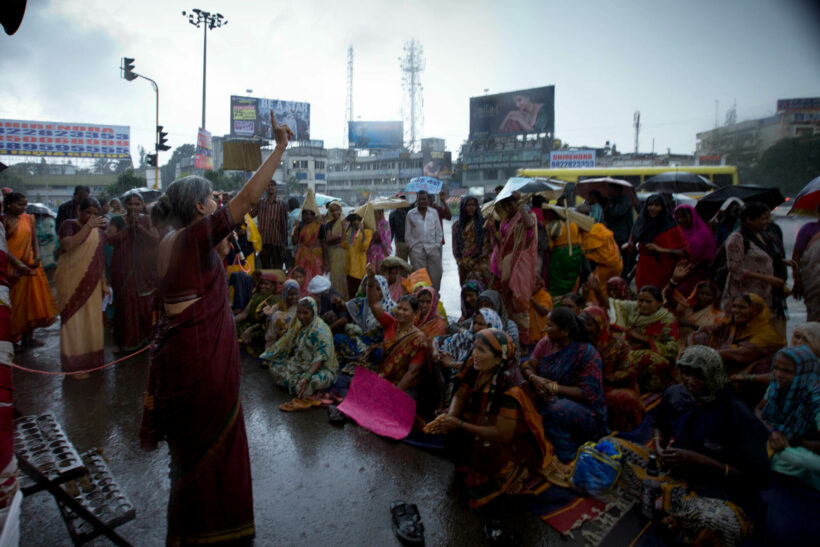LAKSHMI NARAYAN: Creating and Strengthening Waste Pickers’ Sense of Dignity
by Marco Sumayao

“It is necessary that the weakness of the powerless is transformed into a force capable of announcing justice.”
Since the late 1960s, Paulo Freire’s words have spurred countless activists to create social change including the liberation of marginalized people. His book, Pedagogy of the Oppressed, laid the blueprint for critical pedagogy, a social movement that empowers the poor to uplift themselves through education, socio-political critique, and action. Freire’s pedagogy would eventually inspire movements around the world, including Lakshmi Narayan’s work in creating and strengthening a sense of professional dignity among waste pickers in India.
Lakshmi grew up in Pune, the second-largest city in the state of Maharashtra. After completing her graduation in Philosophy, she pursued formal education in Mumbai, where she earned a Master’s degree in Social Work. She was convinced that a career in academia, although intellectually enticing, wouldn’t satisfy her after graduating; she felt the need to work for real social change.
She moved back to Pune after completing her degree and got a job in the Department of Adult Education at SNDT Women’s University, India’s first women’s university. Along with her colleagues, she interpreted education as a form of empowerment — it wasn’t enough to just teach literacy and numeracy; positive change among the urban poor was critically required. Freire’s pedagogy was one of the philosophies that guided Lakshmi and her peers in their mission, as they engaged with some of the most powerless communities in the city.
“We soon realized that one of the most marginalized groups in Pune were waste pickers, who could not even make it to meetings we organized because they were working very, very long hours,” she shared. “They had to be out at the crack of dawn to survive.”
India’s waste pickers collect and categorize trash, sorting out recyclable and reusable materials prior to the municipality’s collection efforts. This informal system significantly contributes to the country’s solid waste management; for instance, India recycles 70% of all used PET bottles, versus just 31% in the United States. Waste pickers divert approximately 20-25% of a city’s waste—equivalent to several million tonnes of trash per year—away from landfills, saving the government millions of rupees in handling and transportation costs.
At the time Lakshmi began her work, a waste picker’s typical schedule began at dawn and ended late in the evening, with barely any time for breaks. Since most labor and welfare surveys took place during office hours, waste pickers were often excluded and essentially voiceless in matters surrounding workers’ rights. Compounded by the fact that they were routinely harassed for doing what others considered dirty, undignified work, Pune’s waste pickers were one of the community’s most vulnerable sectors.
In order to better understand their issues, Lakshmi immersed herself in the waste pickers’ community. “We believed in a participatory process of organizing waste pickers, where they could come together, articulate their issues, analyze their conditions of work, the key sources of harassment, and debate the best strategic collective action to address them as the most sustainable way to move forward,” she explained. “In the course of our interactions and dialogues, discussions and meetings, and sharing of experiences as we went around collecting waste with them, a number of ideas emerged.”
Lakshmi and her team saw firsthand the harassment faced by waste pickers from the police, who routinely accused them of theft and abused their power in multiple ways. They learned about exploitative loan sharks who preyed upon the waste pickers’ vulnerable situations. They heard stories of homeowners who shunned waste pickers and refused them drinking water in their regular glassware, saying they were too dirty. It was not uncommon for people to hold their noses as they passed them on the street, or turn a blind eye as they fended off stray dogs at the garbage bins. As most waste pickers in Pune were women, they were marginalized on account of their caste, class and gender.
“We realized that a trade union of waste pickers would establish the environmental, social, economic contribution they make as workers, and offer the right platform to make demands of the local, state, central and international governments,” Lakshmi said.
In 1993, they registered Kagad Kach Patra Kashtakari Panchayat (KKPKP), a democratic trade union of waste pickers, that sought to protect their rights, improve their work conditions, restore their dignity within the community, and uplift their general quality of life.
Since then, KKPKP through a combination of dialogue, protests, research and systemic engagement, has significantly transformed the work and lives of its member waste pickers. In 2006, KKPKP laid the foundation for SWaCH, India’s very first wholly-owned cooperative of self-employed waste pickers, which integrated them directly into the city’s own solid waste management system. This partnership with the local government has further legitimized the waste pickers’ enterprise in the eyes of the city and its citizens.
Today, waste pickers in Pune have identity cards that recognize them as crucial workers and are paid monthly fees by the households they service. They no longer have to dig through piles of garbage by the wayside, putting themselves at risk of injury from sharp scraps or wild animals; instead, they collect waste directly from doorsteps. When they face harassment from a police officer, a government official, or any other form of authority, they have the full support of hundreds of their peers in demanding—and securing—justice. They are provided health insurance, support for their children’s education, and financial support from their very own credit societies.
The waste pickers are also now widely recognized as some of the city’s frontline environmentalists. Apart from diverting waste from dump sites and incinerators, their waste collection model is largely push cart based, with an extremely low carbon footprint. Since their work promotes source separation, both environmental groups and ordinary citizens acknowledge them as an integral part of the city’s sustainability efforts.
Most importantly, KKPKP and SWaCH have helped Pune’s waste pickers find a sense of pride in their work, and in their place in the community. “There’s a change in the way waste pickers look at themselves, in how society looks at them, in how they look at society, and themselves in it,” Lakshmi continued.
“The empowerment goes beyond their work, and translates into them challenging the status quo in their communities and within their families, in the way they bring up and educate their daughters, speak up against abusive husbands, and show low tolerance to community goons. But we have a long way to go….a radical change in the socio-economic political context will be needed before they are completely accepted by one and all within the city’s fabric,” she added.
Lakshmi and others like her, see the need to continue this work far longer. While there has been a lot of improvement since the 1990s, there is still much more to be done in uplifting the lives of Pune’s waste pickers. Today, Pune has several activists, working closely with the waste picker organizations, and offering support for waste pickers to pull themselves out of their past powerlessness.
And, as Freire would put it, their weakness will continue to transform into a force for justice.










